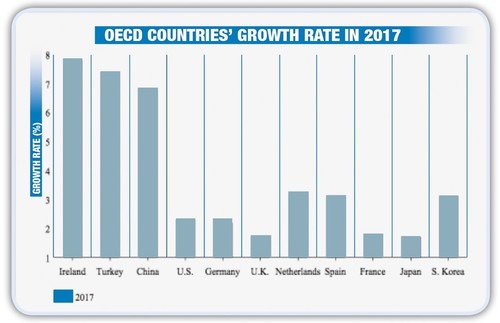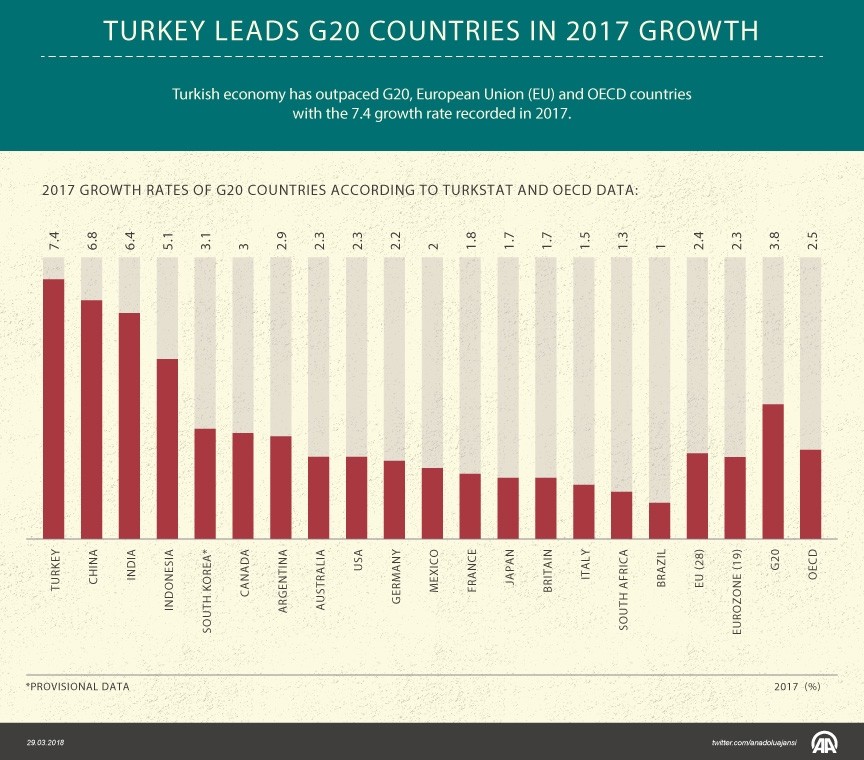© Turkuvaz Haberleşme ve Yayıncılık 2024
The Turkish economy registered the highest growth rate at 7.4 percent since 2013 when Turkey's economy expanded by 8.5 percent. With last year's data, the Turkish economy has delivered a sustainable and steady performance as it has grown for eight years in a row. The growth performance was interpreted as a strong indication of how Turkish markets quickly recovered from the July 15, 2016 coup attempt in which the economy expanded 3.2 percent. Solid macroeconomic indicators such as capacity utilization rate, industrial output and quarterly economic data already suggested throughout the year that 2017 economic growth will surpass the forecasts of international finance corporations.

Marking a significant rebound compared to the 3.2 percent growth the country posted in 2016, economic growth in 2017 confirmed Turkey's status as one of the world's fastest growing economies.
Although many of these institutions gradually revised the forecasts periodically, the 7.4 percent growth still managed to beat the previously declared predictions. The International Monetary Fund (IMF) forecast that the Turkish economy would register growth of 7 percent 2017 and the Organization for Economic Cooperation and Development (OECD) said that the economy will grow by 6 percent. The U.S.-based credit rating agencies Moody's and Fitch said the country's economy was expected to grow by 6.7 percent and 5.5 percent respectively.
Goldman Sachs became the first foreign financial corporation to comment on the above-the-expectations growth rate of Turkey and expressed that the Turkish economy delivered a surprisingly strong growth.Sharing remarks about the GDP growth rate data, Deputy Prime Minister in charge for the economy Mehmet Şimşek said the Turkish economy has come to the forefront among the OECD, EU and G20 countries in terms of growth rate.The Turkish economy grew 7.4 percent in 2017, compared with the previous year, the Turkish Statistical Institute (TurkStat) announced Thursday.
GDP at current prices climbed to over TL 3.1 trillion ($850.7 billion) last year, up 19 percent from 2016, according to TurkStat.The total value added of services and industry rose by 10.7 percent and 9.2 percent, respectively, while the construction sector boasted an 8.9 percent rise. The agricultural sector enjoyed a 4.7 percent hike in 2017, compared to 2016.

TurkStat also revealed that Turkish economic growth in the last quarter of 2017 reached 7.3 percent, compared with the same quarter of previous year."Gross domestic product increased by 19 percent and reached TL 889.2 billion at current prices," it said.After the announcement of the growth data, the Turkish lira started to spike against the U.S. dollar.
The Turkish lira tumbled down against the US dollar and depreciated by almost 6 percent since the beginning of March. But after the release of the data, the lira appreciated by one percent and became the best performing currency. Around 5:11 p.m., the Turkish lira was traded at 3.96 from 4.01 around noon.Şimşek sighted that while growth in 2017 was driven by domestic demand, net external demand has also made a limited positive contribution to the growth. "An annual real increase of 11.7 percent in the machinery equipment investments in the second half of the year supports the growth outlook for the coming period," said deputy prime minister.
Turkey has reached its employment targets last year as well, noting that with the seasonally adjusted figures, an additional employment was provided to 1.635 million people as of December 2017.Şimşek suggested they foresee a continuation of the contribution of external demand to the growth. "We expect the strong outlook in the European economy, along with the increase in oil prices and the continuation of strengthening demand of our trading partners oil exporters and recovery in tourism industry, and our foreign demand to contribute positively to the growth in the upcoming period," he added.
Regarding the targets for the coming period, Şimşek said the government will continue to take steps that will increase country's competitiveness, reduce its vulnerabilities, and steps that will provide country with an increase in the value-added chain and reduce its dependence on foreign investors.U.S.-based finance giant Goldman Sachs said Thursday the Turkish economy showed a surprisingly strong growth in the whole of 2017 due to the GDP growth which surpassed expectations in the third and fourth quarter, noting that the growth of 7.4 percent in 2017 was above the 7 percent growth the institution anticipated and above the market estimates.
Goldman Sachs indicated it expects the growth in 2018 to be 4 percent in parallel with market expectations, sighting that the pro-growth policies of the government are creating an upside risk for its opinion. It also referred to the statement of Prime Minister Binali Yıldırım who announced an investment incentive package of TL 128 billion, an incentive corresponding to 4.1 percent of the GDP of 2017.
Also commenting on the revealed data, Economy Minister Zeybekci said Turkish economy has ranked first among the G20 economies, which constitute 85 percent of the world economy.In a written statement, Zeybekci pointed out that 2.3 percentage points in 7.4 growth rate of last year came from investment and net exports was really important.Recalling that the European Union and eurozone economies have achieved an average growth rate of 2.5 percent last year, Zeybekci said, "There is a conclusion coming out of this. Turkey is the Europe's fastest growing economy among the big economies, is the most dynamic country, and this will not change over the next 10 years. It is important to grow in a balanced structure that creates employment, does not require excessive borrowing and takes into account macroeconomic balances, and deeply support this growth with investments. We see in the major economies of Europe that the ratio of national debt to national income is between 65 percent and 134 percent.
Turkey's public debt to GDP ratio is below 30 percent."The economy minister also stressed that the international organizations, international financial sector, credit rating agencies and economists were largely mistaken in their data regarding the last year.Recalling that growth forecasts of the IMF, World Bank, OECD and Moody's for Turkish economy for the year of 2017 were 2.9 percent, 3 percent, 3.4 percent and 2.6 percent, respectively, Zebekci said: "I have been attracting attention to third quarter growth since April of last year and I was claiming that we will grow around 7 percent in the whole year. A significant proportion of economists in Turkey did not agree and they expected a growth below 4 percent.
Known circles, in particular, they wanted to break the perception of Turkey's economy but the measures we have taken as a government, our export-investment encouraging incentives and the genetic codes of the Turkish economy and us, who took the dynamic population into account, had believed in our economy.""In the end, we are not surprised that we are the leader in the G20, even leaving China behind. In 2017, international organizations went to revision four times on average last year.
Nevertheless, their low forecasts failed" the economy minister added.Development Minister Lütfi Elvan also indicated that the growth of 7.4 percent of the Turkish economy was the country's best performance since 2013, Anadolu Agency (AA) reported.The development minister said country's economic growth reached the peak among G20 and number two among OECD countries, Elvan said in a statement.Turkish economy will continue to grow in 2018, Development Minister Elvan said, adding that inflation and the current account deficit will be brought down while the country continues structural reforms.
